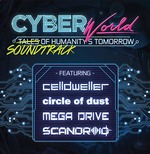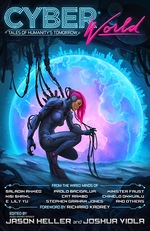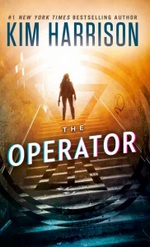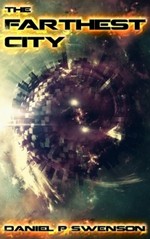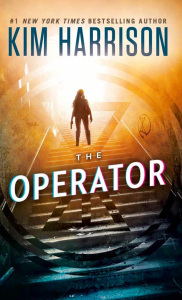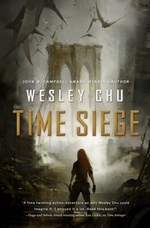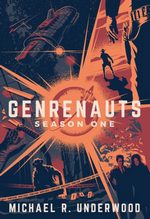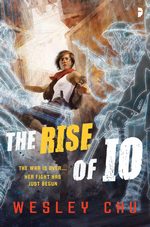by Michael R. Underwood
Series: Genrenauts, #1-6Kindle Edition, 544 pg.
2016

Parallel to our world are various worlds populated by fictional characters in a wide variety of genres (Western, SF, Romance, etc), and when things go wrong in the stories, things go wrong in our world. For example, broken Romance world stories = higher divorce rates here. In this world, there are a number of teams of story specialists who shift to the other worlds to fix the stories and set things back on course here. Leah Tang — a struggling stand-up comic by night, struggling receptionist by day — is the newest recruit. Join her as she learns the ropes, rights wrongs, struggles with ethics, and gets shot at while cracking jokes.
Originally printed as 6 episodes in 5 novellas, now collected in one season-long omnibus, Genrenauats as become one of my favorite series this year and I’m glad to get one more chance to talk about it with the release of the collection this week.
There’s a great cast of characters here, all of which deserve the reader’s time and focus. For example, I was tempted to not-really-ignore, but relegate Angstrom King to back burner status in my mind. He’s the leader, he points the team in a direction, but the real excitement’s with the rest. This was a mistake on my part — think of him like Capt. Picard. Sure, for the most part he sits around in his ready room with some Earl Gray (hot) — but really, some of the more interesting things that happen in he series are because of his actions. King’s not Jean-Luc, but there’s a similar quality.
I love a good team — fiction, TV, comics, you name it — the interaction, the teamwork, the dynamics, there’s really nothing like it. There’s a great team in these novellas — some of the intra-team camaraderie got pushed aside for a little romance that doesn’t really work for me (but I get why it would for others and appreciate the way Underwood’s tackling it). Overall, it’s built on solid interactions and relationships that have plenty of room to grow and develop over the many seasons that we hopefully get of this.
Each adventure gives Underwood an opportunity to talk about various genres — to talk about the clichés, tropes, archetypes, pluses, minuses, and so on of each genre. And one visit to each won’t be enough to fully explore these. Don’t get me wrong, we’re not talking Master’s Theses-esque discussion, he jokes about them, plays with them, sometimes turns them upside down while telling his tale.
The collection includes:
The Shootout Solution — We meet Leah Tang, Angstrom King and the rest of his team. We’re also introduced to the concept of Genrenauts, Story Worlds, the effects that they can have on our world — also, we get a pretty decent story in Western World. Not bad for 148 pages. (For more details, you might want to read my original blog post, my blog post about the audiobook)
The Absconded Ambassador — The team goes to Science Fiction World to help out on a DS9-like Space Station. On the verge of a major treaty being finalized and signed, the Terran ambassador has been kidnapped. It’s up to King and co. to rescue the ambassador and keep the shaky alliance from crumbling in her absence. We learn a little more about everyone, and while having a lot of fun with genre conventions. ( my original blog post, my blog post about the audiobook)
The Cupid Reconciliation — The team gets back up to full strength in time to go rescue a Rom-Com gone awry. Underwood really lets things fly when it comes to observations about the genre and playing with conventions while using them for comedic — and narrative — value. Also — a couple of seeds that were planted in the first two novellas are watered enough that you can see season/season-plus story arcs beginning to grow. The series took a big jump in quality here. ( my original blog post)
The Substitute Sleuth — A Police Procedural needs some help, a no-nonsense cop’s off-the wall/out-of-the-box partner takes a bullet and another pair of mismatched detectives needs to come in and close the case. We get some major backstory stuff here, and the season arc is moved along nicely. The detective story itself isn’t my favorite, but what Underwood does with the tropes, themes, conventions, etc. is really good — it is more of a TV detective story than a novel detective story. Think Castle, not Harry Bosch (whoops, thanks Amazon, you ruined that point…). ( my original blog post)
The Failed Fellowship (Part 1 & 2) — This think kicks off with Leah Tang ranting about fantasy fiction and 5 episodes later, she gets to spend 2 episodes in Fantasy World, where a Chosen One with a Magic Artifact story has fallen to pieces. Leah’s in hog heaven, the rest of the team are at the top of their game and Underwood is, too. Rollicking good adventure. Best of the batch in every way. ( my original blog post)
I dig this series, and having all of the novellas in one handy collection is going to make it easier (I hope) for others to discover it — the collection is also a little cheaper than buying all the individual stories, which will also going to make things easier for people to discover it. If you haven’t dipped your toe in this world/these worlds yet, what are you waiting for?
—–

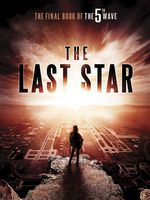 The Last Star
The Last Star





